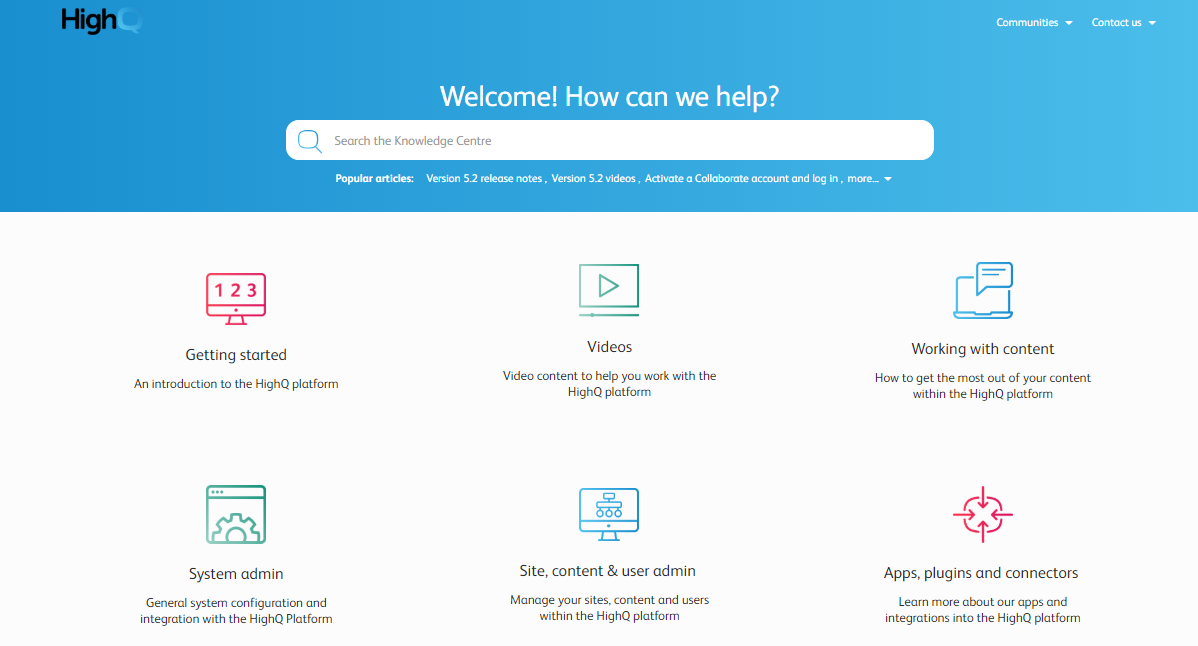
This slip can be detrimental for firms because, increasingly, customers prefer to do business with companies that provide them with positive customer service experiences. As a matter of fact, statistics show that 54% of buyers have higher customer service expectations today compared to a year ago.
Customers also appreciate the fact that customer service is a huge differentiating factor in the business space. A report by Forrester shows that customer experience is a critical factor in determining how companies engage in business.
If you are looking to scale your customer support, here are ten tips to help you achieve this:
1. Make Self-Service Support Available
Some customers prefer to reach out to customer support teams for solutions to issues they have. However, this is slowly changing as customers increasingly want a quick resolution of their problems. One way to achieve this is to provide an online self-service platform that customers can use to find answers or resolve their issues by themselves without engaging customer support representatives.
Thanks to the rising demand for instant gratification, customers expect brands to have a self-service portal on their websites. Some common self-service options your business can use in building customer service processes include:
- FAQ section to address common questions that customers raise. Etsy, whose screenshot appears below, is an excellent example of a business that uses FAQ well.
- Online discussion forums where customers can respond to each other’s queries
- Customer knowledge bases where customers can find the information they need
One of the best examples of self-service support is HighQ. It created a compelling online knowledge center using ProProfs Knowledge Base software. ProProfs equipped HighQ’s customers with a self-service platform, which helped in reducing support tickets to a great extent.

2. Automate Repetitive Tasks With Help Desk Software
There are numerous benefits of automating repetitive customer support tasks. These benefits can increase and become more significant as the business grows. For instance, your customer support representatives who otherwise spend a lot of time on repetitive tasks can save time as well as effort if those tasks are automated.
This translates to higher productivity for your business. The more your customer support team grows, the more automation of common tasks will enable your firm to save time throughout the year. In monetary terms, this will translate to thousands of dollars in savings. This amount can be applied to other scaling efforts within your business.
An easy way to automate repetitive tasks is through the use of help desk software. Some common features in help desks that facilitate automation of customer support tasks include:
- Automatic routing of customer queries
- Consolidating queries or feedback from multi-channel communication
- Standard replies that allow support teams to add common phrases in messages
3. Equip Your Team With Relevant Skills and Information
Around 62% of customers consider service knowledge and insights on important aspects of good customer service experience. At the same time, providing prompt answers to customers is essential when it comes to retaining customers. To do this effectively, customer support teams need to have the necessary skills and information.
When your business operations are still low with a small customer support team, it is easy to train your support staff, track their performance, and make a strategy or product changes. However, as your organization grows, the customer support team expands as well. This makes it challenging for companies to train their squad of operators.
At this point, you should focus on turning to a different channel for training purposes. For instance, you can create an employee handbook or training documentation wherein you can document the training processes, making them easily accessible to the support team. Such a cloud-based platform works as an information resource that helps you train existing staff as well as onboard new team members to the team.
A cloud-based knowledge platform also serves as a complete and quick reference point for current staff whenever they experience challenges or need to adapt to change. This not only keeps everyone in the team updated, but it also saves customer support teams time and effort, enabling them to focus on serving customers and addressing their concerns effectively.
4. Provide Clients With Customer Support Options
The main reason you want to scale your customer support is that your customer base has grown. When preparing to achieve this, you need to appreciate that your customer support staff are not the only ones who need to get ready for this growth, your customers also need to be able to reach you with ease.
The reality is that customers prefer to use different communication channels to access your services. In the U.S., messaging, emails, and phone calls are among the leading communication channels that customers prefer most, according to a study by Twilio.

This means companies that want to scale customer support in the U.S. need to ensure that customers are able to reach customer representatives via messaging applications such as SMS, Whatsapp, and Facebook Messenger.
But, the current trend also indicates that most customers opt to resolve issues by themselves with statistics showing that more than 60% of customers in the U.S. prefer to use self-service portals to resolve simple customer service issues.
6. Make It Easy for Customer Service Teams to Find Emails
Companies that use individual email inboxes to contact customers can experience challenges in locating support emails. Consequently, this can slow down the speed with which the support teams address customer issues, which can cause negative customer experiences for those seeking help.
When scaling customer support, you should consider upgrading your email support to shared inboxes and making support emails easy to search for your support staff. With shared and searchable inboxes, the process of onboarding new customer support staff becomes easier because employees can search email history, find pending customer issues, and fast track ticket resolution.
At the same time, your support team can review old customer tickets to find out what they need to do and avoid interrupting their colleagues every time customers submit a query.
7. Streamline the Hiring Process to Get Talented Staff
Hiring additional customer support staff is an integral part of scaling customer support. This is because rapid business growth can put you in a situation where you need to scale your customer services within a short time.
While bringing onboard new customer support representatives is critical to satisfying your clients and expanding your operations, the process of hiring them should not be hasty. New support employees need to have specific skills for job success. While they can learn specifics about the products or services your business offers on the job, you need to ensure that they possess skills such as organization, adaptability, and patience during the hiring process.
You may need to take personality and aptitude tests during the interview process to evaluate how fit they are for your existing team. Doing this ensures that the people you bring on board to scale your customer support add value to your business and the customer service team.
8. Pick the Right Customer Support Tools
As you scale your customer support team, it should also expand the toolset that the team uses to serve customers daily. Ensure that the tools you pick are flexible to accommodate the growing number of customer support representatives as well as customers.
In most instances, you can achieve this flexibility by taking up a subscription service that offers the features your company needs. Further, the tools you pick to scale customer support should facilitate internal collaboration among teams for faster and effective resolution of customer queries.
Having these features integrated into customer support tools helps in:
- Reducing duplication of tasks
- Fostering accountability and cooperation among teams
- Fast-tracking resolution of customer issues
8. Adjust Your Company’s Workflow Processes
Businesses that experience a spurt in growth can end up dipping the efficiency and quality of its customer service. The same team that was providing customer service to the business prior to its expansion cannot be relied upon to service the growing customer base effectively. As such, growing businesses should consider increasing the count of their support team members and adjust their workflow processes to scale its customer support services as it desires. One way to achieve this is to craft a strategy that is precise and focused during the customer support scaling process. Such an approach helps you to keep sight of your service standards and goals. You can achieve this by reviewing your workflow processes and using the insights from those reviews to identify:
One way to achieve this is to craft a strategy that is precise and focused during the customer support scaling process. Such an approach helps you to keep sight of your service standards and goals. You can achieve this by reviewing your workflow processes and using the insights from those reviews to identify:
- Activities that it needs to start focusing on
- Activities that it needs to continue undertaking or implementing
- Activities that it needs to stop implementing
9. Track How Your Customer Support Efforts Are Progressing
To ensure that your customer support standards do not drop as your business grows, you must track your support strategy in terms of performance and quality. While it may not be feasible to monitor every single aspect of the customer service team performance, it is advisable that you identify the most strategic aspects for evaluation.
As such, spot key performance indicators that are critical to the success of your business. They can include:
- Customer satisfaction metrics to get an idea of possible changes in service quality
- Missed customer calls and average wait time to identify support team gaps and reinforcement needs
- After call work time and average call handling metrics to identify areas of friction, success and collective team performance
10. Build Customer Communities
One of the most effective ways to provide customer support is through loyal customers. Creating forums on your website can go a long way in empowering customers to help each other to find solutions to their queries and issues. When scaling your customer support efforts, consider leveraging your community to provide answers to those that need help.
Customers who have used your products or services for a long time tend to gain expertise in them. Setting up an online community enables you to leverage their knowledge to help others address their challenges. Often, extensive product users form part of your fan base, and your fans will be found among your customers. By tapping this resource, you will be able to deflect many commonly asked questions and in the process, build a strong community of supporters.
Final Word
Customer support plays a vital role in fanning business growth. If neglected, customer service can cost you a considerable amount of revenue as customers turn their attention to competitors. As your company grows, it is important to scale your customer support efforts to ensure that the standards and quality of your support services remain unaffected.
If you are looking to improve your customer service in line with your firm’s growth, consider implementing the ten tips to scale customer support discussed above in your business and watch as your organization soars to greater heights.
Do you want a free Knowledge Base?
We have the #1 Online Knowledge Base Software for instant self-help








Comment